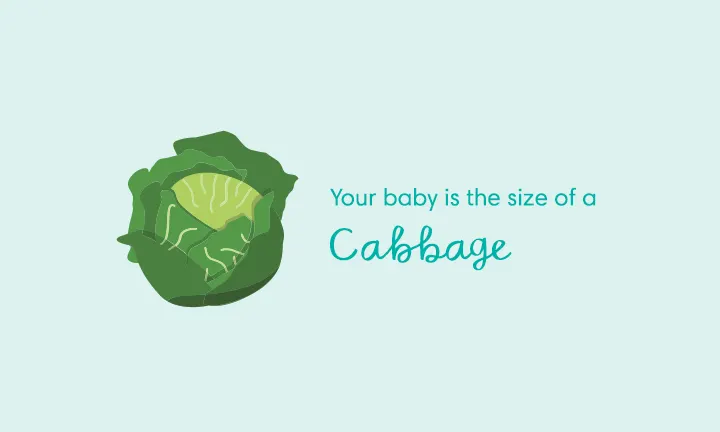30 weeks pregnant
When you’re 30 weeks pregnant, your baby is somewhere around 43 centimetres long and weighs approximately 1.1 to 1.4 kilograms. During 30th week of pregnancy, you may notice your skin getting itchy as it stretches over your baby bump, and you may feel a little winded as well. Your baby’s brain continues to develop, red blood cells begin to form in his bone marrow, and his bones also start to harden. He might even sport a full head of hair by now. There’s lots more going on this week that you might want to find out about – read on to learn more.
30 Weeks Pregnant: Your Baby’s Development
At 30 weeks pregnant your baby may develop in the following ways:
Making headway. At 30 weeks pregnant, your baby’s brain will continue to develop, and around this week, it’ll start to wrinkle as those creases and folds form to make room for new tissue. These are also known as convolutions, which allow the brain to hold more brain cells.
New blood. Red blood cells start to form in your baby’s bone marrow.
Bones hardening. Around 30th week of pregnancy, your baby’s bones will start to harden. However, his skull will remain soft and flexible in preparation for delivery. That’s because the soft bones of the skull will pass over each other as your baby makes his way through the narrow birth canal. This makes the skull a little smaller, so he can pass through more easily. For this reason, some babies are born with a cone-shaped head. Don’t worry though, the skull goes back into shape soon after the birth.
Full head of hair. This week, your baby may have hair on his head. Remember, though, each baby is unique. Some don’t have much or any hair at birth.

30 Weeks Pregnant: Your Symptoms
When you get to 30 weeks of being pregnant, the symptoms you may experience include:
The seventh-month itch. As your skin stretches, you may notice that your belly starts itching. This is another normal part of pregnancy. Just take care not to scratch the itchy skin, as this will just make it worse. Instead, try massaging your abdomen gently with moisturising lotion. Read more about itchy skin during pregnancy for more tips.
Losing your breath. As your uterus gets bigger and pushes your diaphragm up into your lungs, breathing gets more difficult. Toward the end of your pregnancy (around 37 or 38 weeks pregnant) though, you may find breathing a little easier, as your baby drops down into your pelvis, easing up on your diaphragm and lungs. If you have problems breathing when you lie down, try sleeping in a semi-sitting position, using pillows for support.
When you get to your 30th week of pregnancy, you’re in your third trimester, and if you’re wondering how many months pregnant that is, you’re approximately in the sixth month of pregnancy.
If you’re 30 weeks pregnant with twins, then you can read more about your babies’ development in our article on expecting twins during pregnancy.
FAQ at 30 Weeks
What is the risk of my baby being born prematurely?
Preterm birth can occur between weeks 20 and 37 and affects approximately 10 percent of pregnancies. Many causes of prematurity are not known, but risk factors include
infections in the mom-to-be, such as urinary tract infections and gum disease
carrying twins or multiples
a previous preterm delivery
fertility problems, a previous second trimester abortion, or miscarriage
becoming pregnant six weeks or less after a previous birth
being younger than 17 or older than 35
smoking
To find out even more about preterm labour, read our article of the causes and signs of preterm labour.
Are there any extra nutrients I might need at 30th week of my pregnancy?
Yes! Calcium from milk or dairy products that you eat will go straight to building your baby’s bones. It’s also good for you as well, as calcium helps keep your circulatory, muscular, and nervous systems healthy. Prevent iron deficiency by eating more lean red meat and dark, leafy greens as your body needs double its intake to produce more blood so your body can provide the baby with oxygen. It’ll also help your baby, as iron from your prenatal vitamins and iron-rich foods will boost his iron supply until he’s a 6 to 9 month old infant. At 30th week of your pregnancy, protein is also crucial, as it supports healthy cell growth throughout your baby’s body.
30 Weeks Pregnant: Your Checklist
Get plenty of calcium, iron, and protein to help your baby develop. Get week-by-week expert tips on pregnancy to keep track of your baby’s development & to ensure well-being of both you & your baby during entire nine months journey!
Massage your itching belly with lotion; scratching will only make it worse
Take a childbirth class and practice the techniques you learn. Here are some tips to find an ideal birthing class for both you & your partner to learn & understand about childbirth.
Sign up for weekly pregnancy tips
Related week by week pregnancy guides

